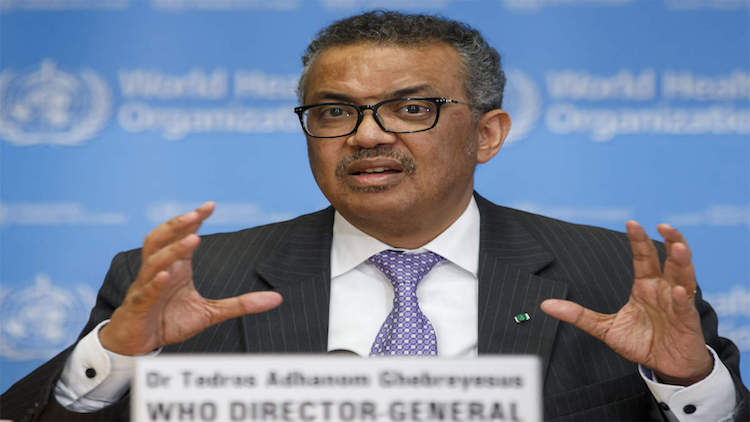Lockdown Not Enough To Fight COVID-19, Says WHO Chief

The pandemic continues to take a massive toll not just on health, but on so many parts of life, said the World Health Organisation in a media briefing on Wednesday.
"Yesterday, the Government of Japan and the International Olympic Committee took a difficult but wise decision to postpone this year’s Olympic and Paralympic Games. I thank Prime Minister Abe and the members of the IOC for making this sacrifice to protect the health of athletes, spectators and officials," said the WHO Director-General Dr Tedros Adhanom Ghebreyesus.
He said: "We look forward to next year's Olympics and Paralympics, which we hope will be an even bigger and better celebration of our shared humanity – and I look forward to joining. "We have overcome many pandemics and crises before. We will overcome this one too. "The question is how large a price we will pay. "To slow the spread of COVID-19, many countries have introduced unprecedented measures, at significant social and economic cost – closing schools and businesses, cancelling sporting events and asking people to stay home and stay safe. "We understand that these countries are now trying to assess when and how they will be able to ease these measures. "The answer depends on what countries do while these population-wide measures are in place. "Asking people to stay at home and shutting down population movement is buying time and reducing the pressure on health systems. "But on their own, these measures will not extinguish epidemics. "The point of these actions is to enable the more precise and targeted measures that are needed to stop transmission and save lives. "We call on all countries who have introduced so-called “lockdown” measures to use this time to attack the virus. "You have created a second window of opportunity. The question is, how will you use it? There are six key actions that we recommend.
He said: "We look forward to next year's Olympics and Paralympics, which we hope will be an even bigger and better celebration of our shared humanity – and I look forward to joining. "We have overcome many pandemics and crises before. We will overcome this one too. "The question is how large a price we will pay. "To slow the spread of COVID-19, many countries have introduced unprecedented measures, at significant social and economic cost – closing schools and businesses, cancelling sporting events and asking people to stay home and stay safe. "We understand that these countries are now trying to assess when and how they will be able to ease these measures. "The answer depends on what countries do while these population-wide measures are in place. "Asking people to stay at home and shutting down population movement is buying time and reducing the pressure on health systems. "But on their own, these measures will not extinguish epidemics. "The point of these actions is to enable the more precise and targeted measures that are needed to stop transmission and save lives. "We call on all countries who have introduced so-called “lockdown” measures to use this time to attack the virus. "You have created a second window of opportunity. The question is, how will you use it? There are six key actions that we recommend.
- First, expand, train and deploy your health care and public health workforce;
- Second, implement a system to find every suspected case at community level;
- Third, ramp up the production, capacity and availability of testing;
- Fourth, identify, adapt and equip facilities you will use to treat and isolate patients;
- Fifth, develop a clear plan and process to quarantine contacts;
- And sixth, refocus the whole of government on suppressing and controlling COVID-19.

Latest Videos
















